Don’t miss the excellent piece on the importance of immigrants to Silicon Valley in the New York Times February 9, 2017. Some highlights: “Silicon Valley is unlikely, as a phenomenon — it is not the default state of the world,” said John Collison, an immigrant from Ireland who is a [continue reading . . . ]
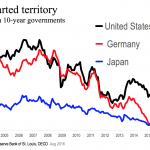
For a quick economic update for members of Bellevue Rotary recently, I updated several slides I usually include as a part of my talks and added a new one or two. You can download all of them as a PDF file here. Among bullet points: We live in a slow-growth world. [continue reading . . . ]
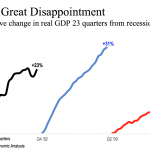
June marks the end of the sixth year since the Great Recession passed into history. At 18 months, it was the lengthiest recession since World War II, surpassing the 16 months of the other notably long-lived post-war recessions, ended in March 1975 and November 1982. For duation, of course, the [continue reading . . . ]
For those of a certain age, the billboard remains etched in memory. It was April 1971. Boeing employment over the course of about three years had collapsed from more than 100,000 to fewer than 40,000 following cancellation of government funding for a supersonic transport and commercial orders for the then-shiny-new [continue reading . . . ]
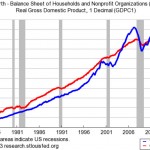
A correspondent who heard me last week on KUOW‘s Weekday program asks if there is research on “a correlation between the wealth lost in a downturn and the length of following recovery.” I told him the book to read is This Time Is Different: Eight Centuries of Financial Folly By Carmen [continue reading . . . ]
Don’t miss today’s New York Times obit of the 1986 Nobel laureate and George Mason University professor James M. Buchanan. Like everyone else, Buchanan taught, politicians tend to act in their own self-interest Courting voters at election time, for example, legislators will approve tax cuts and spending increases for projects [continue reading . . . ]
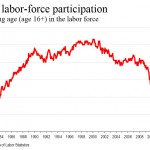
Some things I hope to cover on the business-economy segment on KUOW today: U.S. economy: The Bureau of Economic Analysis announced October 26 that the U.S. economy grew at annual rate of 2.0% in the July-September quarter, much better than the 1.3% rate in the summer quarter. In real terms [continue reading . . . ]
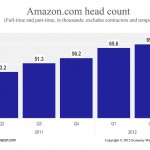
Amazon.com is on a roll. Last Friday, it announced a blockbuster real-estate deal, the purchase of its South Lake Union campus for more than $1 billion. It unveiled late in summer plans for three high-rise office towers on the edge of downtown Seattle — a quick streetcar ride from its [continue reading . . . ]
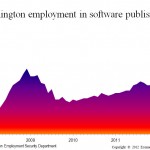
If you live in the Seattle area, savor this time. It seems to me you and I live in a lush oasis of relative prosperity, surrounded by a grimy desert of gloomy economic news. There are no guarantees. Enjoy it while it lasts. Boeing is booming. Aerospace employment in Washington [continue reading . . . ]
Martin Wolf, much-honored chief economics commentator of the Financial Times, has been my beacon during the financial crisis. So it is especially discouraging to read his June 6, 2012, column, headlined “Panic has become all too rational”. Wolf argues that the advanced economies are caught in a “contained depression,” that [continue reading . . . ]
“For Big Companies, Life is Good.” That was the headline on the Marketplace Section front page of the Wall Street Journal April 9. The item reported that sales, profits and employment of the largest American companies, the Standard and Poor’s 500, last year exceeded the highs reached before the Great [continue reading . . . ]
Former Clinton Labor Secretary Robert Reich, now at Berkeley, is as articulate and passionate as any economist on the left. He is ubiquitous on cable-tv shoutfests. I keep waiting for him to say with conviction that the private sector must create wealth before the government can redistribute it. I’m not [continue reading . . . ]